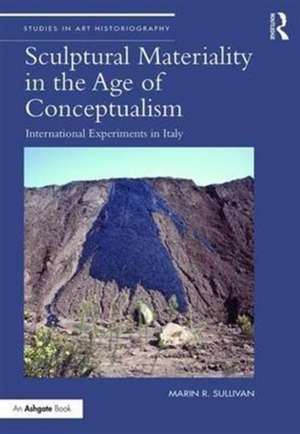Sculptural Materiality in the Age of Conceptualism: International Experiments in Italy: Studies in Art Historiography
Autor Marin R. Sullivanen Limba Engleză Hardback – 5 dec 2016
| Toate formatele și edițiile | Preț | Express |
|---|---|---|
| Paperback (1) | 387.75 lei 6-8 săpt. | |
| Taylor & Francis – 30 sep 2021 | 387.75 lei 6-8 săpt. | |
| Hardback (1) | 879.23 lei 6-8 săpt. | |
| Taylor & Francis – 5 dec 2016 | 879.23 lei 6-8 săpt. |
Din seria Studies in Art Historiography
-
 Preț: 312.75 lei
Preț: 312.75 lei -
 Preț: 355.68 lei
Preț: 355.68 lei -
 Preț: 313.05 lei
Preț: 313.05 lei -
 Preț: 311.26 lei
Preț: 311.26 lei - 9%
 Preț: 935.85 lei
Preț: 935.85 lei - 9%
 Preț: 1003.47 lei
Preț: 1003.47 lei -
 Preț: 311.61 lei
Preț: 311.61 lei - 16%
 Preț: 261.28 lei
Preț: 261.28 lei - 12%
 Preț: 328.19 lei
Preț: 328.19 lei - 17%
 Preț: 259.98 lei
Preț: 259.98 lei -
 Preț: 387.75 lei
Preț: 387.75 lei -
 Preț: 389.27 lei
Preț: 389.27 lei - 25%
 Preț: 769.66 lei
Preț: 769.66 lei -
 Preț: 390.80 lei
Preț: 390.80 lei - 17%
 Preț: 259.98 lei
Preț: 259.98 lei -
 Preț: 396.02 lei
Preț: 396.02 lei -
 Preț: 418.65 lei
Preț: 418.65 lei -
 Preț: 449.41 lei
Preț: 449.41 lei -
 Preț: 381.72 lei
Preț: 381.72 lei -
 Preț: 383.30 lei
Preț: 383.30 lei -
 Preț: 449.41 lei
Preț: 449.41 lei - 9%
 Preț: 936.74 lei
Preț: 936.74 lei - 12%
 Preț: 299.52 lei
Preț: 299.52 lei - 12%
 Preț: 325.34 lei
Preț: 325.34 lei - 17%
 Preț: 258.09 lei
Preț: 258.09 lei - 18%
 Preț: 1048.88 lei
Preț: 1048.88 lei - 30%
 Preț: 799.70 lei
Preț: 799.70 lei - 17%
 Preț: 258.91 lei
Preț: 258.91 lei -
 Preț: 386.61 lei
Preț: 386.61 lei
Preț: 879.23 lei
Preț vechi: 1180.28 lei
-26% Nou
Puncte Express: 1319
Preț estimativ în valută:
168.25€ • 173.83$ • 139.96£
168.25€ • 173.83$ • 139.96£
Carte tipărită la comandă
Livrare economică 19 martie-02 aprilie
Preluare comenzi: 021 569.72.76
Specificații
ISBN-13: 9781472465986
ISBN-10: 1472465989
Pagini: 210
Ilustrații: 67 Halftones, black and white; 67 Illustrations, black and white
Dimensiuni: 174 x 246 x 18 mm
Greutate: 0.66 kg
Ediția:1
Editura: Taylor & Francis
Colecția Routledge
Seria Studies in Art Historiography
Locul publicării:Oxford, United Kingdom
ISBN-10: 1472465989
Pagini: 210
Ilustrații: 67 Halftones, black and white; 67 Illustrations, black and white
Dimensiuni: 174 x 246 x 18 mm
Greutate: 0.66 kg
Ediția:1
Editura: Taylor & Francis
Colecția Routledge
Seria Studies in Art Historiography
Locul publicării:Oxford, United Kingdom
Cuprins
Introduction: Meshworks and Networks
Sculptural Materiality
Action and Circulation in Postwar Italy
1. Reflective Acts: Yayoi Kusama in Venice
"Sideshow" Sculpture and the XXXIII Venice Biennale
Photographic Mirrors
Self, Sculpture, and Photograph
Remnants and Residuum
2. With Time Action: Michelangelo Pistoletto in Turin
Mirror Images and Minus Objects
Con temp l’azione
The City as Material
From the Street to the Cage
3. Slow Dissolves: Robert Smithson in Rome
Exhibiting Process
The Flow of Sculpture
Photography is Action
The Age of Conceptualism
4. The Sculptural Arena: Joseph Beuys in Naples
The Mediterranean Situation
Transmitters
Between Image and Object
Sculpture as Multiple
Conclusion: Material Dispersions
Recreations and Replicas
Inert Monuments and Enlivened Objects
Sculptural Materiality
Action and Circulation in Postwar Italy
1. Reflective Acts: Yayoi Kusama in Venice
"Sideshow" Sculpture and the XXXIII Venice Biennale
Photographic Mirrors
Self, Sculpture, and Photograph
Remnants and Residuum
2. With Time Action: Michelangelo Pistoletto in Turin
Mirror Images and Minus Objects
Con temp l’azione
The City as Material
From the Street to the Cage
3. Slow Dissolves: Robert Smithson in Rome
Exhibiting Process
The Flow of Sculpture
Photography is Action
The Age of Conceptualism
4. The Sculptural Arena: Joseph Beuys in Naples
The Mediterranean Situation
Transmitters
Between Image and Object
Sculpture as Multiple
Conclusion: Material Dispersions
Recreations and Replicas
Inert Monuments and Enlivened Objects
Notă biografică
Marin R. Sullivan is Assistant Professor of Art History, Department of Art, Keene State College, USA.
Recenzii
"While the book addresses one Italian artist, Pistoletto, it underscores the radical artistic subculture in Italy during this period. Moreover, it demonstrates that the tension between materiality and immateriality that ran through arte povera yielded a welcome environment for international artists wishing to undertake such projects as well as a support system for their patronage, realization, documentation and photography."
-Rosalind McKever, Art History
-Rosalind McKever, Art History
Descriere
Sculptural Materiality in the Age of Conceptualism is structured around four distinct but interrelated projects initially realized in Italy between 1966 and 1972: Yayoi Kusama’s Narcissus Garden, Michelangelo Pistoletto’s Newspaper Sphere (Sfera di giornali), Robert Smithson’s Asphalt Rundown, and Joseph Beuys’s Arena. Here, they anchor a transnational narrative in which sculpture emerged, as a node, a center of transaction comprised of multiple material phenomena, including objects, images, and actors.
